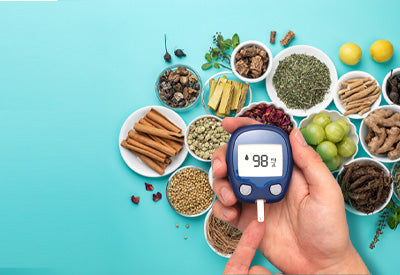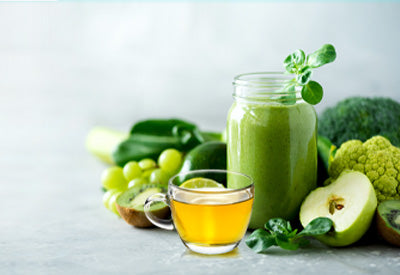Diabetes: Ayurvedic Home Remedies, Causes, Types and Symptoms
Diabetes: Ayurvedic Home Remedies, Causes, Types and Symptoms
Types of Diabetes
There are three types of diabetes. Type 1 is called juvenile or insulin-dependent diabetes. Type 2 is known as diabetes mellitus. The last one is gestational diabetes. Since many are affected by types 1 and 2, we will discuss these in detail. Type 1 – Juvenile diabetes Type 1 diabetes is an autoimmune disease that lasts a lifetime. An autoimmune disease is accidentally caused when the immune system attacks a person’s cells and tissues that they are supposed to protect. The beta cells in the pancreas, which produce insulin, are destroyed in type 1 diabetes. Type 2 – Diabetes mellitus In type 2 diabetes, an affected person’s body cannot produce energy properly from the digested food. Even though the pancreas produces insulin, diabetes mellitus does not allow the secreted insulin to perform its role. Thus, the body’s proper functioning is primarily impacted by this illness.Causes of diabetes
Insulin is formed to control the blood sugar level. Whenever there is an imbalance in maintaining the glucose level in the body, people are affected by diabetes. This happens when the pancreas cannot make enough insulin when the cells do not respond to insulin or both.Symptoms of diabetes
Any disease or medical condition can easily be diagnosed with signs of early onset. If you see the following symptoms, consult your doctor.Type 1 diabetes symptoms
The Type 1 diabetes symptoms can be mild in the beginning but can worsen with time. They can include excessive thirst and hunger, weight loss for no reason, frequent urination, and yeast infections in the vaginal area. Since the symptoms are common for both types, read about these in detail below.Type 2 diabetes symptoms
Type 2 is the most common, as 90% of people have it. If someone has this condition, the body does not produce enough insulin or does not use insulin the way it should. This hormone helps your blood carry glucose to cells. So, if there is a problem with insulin production, there could be a buildup of extra glucose. Type 2 can be controlled with a few lifestyle changes and be detected in the early stages with these symptoms. They include:- Increased thirst and hunger – When more glucose is in the blood, the kidneys work twice as hard to reduce it. As this process takes up more fluids from the cells, a person can feel thirsty often. As insulin production is affected, food will not be broken down efficiently to supply all the cells and tissues. In this case, the patient experiences hunger more often.
- Frequent urination – Since the kidneys' work gets intense, a person has the urge to urinate at regular intervals of time.
- Dry mouth– Dehydration and frequent urination make a person’s mouth dry.
- Weight loss– As more sugar is lost, the patient burns more calories than usual, resulting in weight loss.
- Fatigue– Dehydration and the body's inability to use and store energy like before make someone feel tired constantly.
- Blurry vision and headaches– High blood sugar levels mess up the functioning of the heart. In turn, the patient has trouble concentrating and can have frequent headaches.
- Chronic infections and sores– People with type 2 diabetes find it hard to get rid of infections and wounds, even after a long time.
- Damaged nervous system– Hands and legs will tingle, as diabetes affects the nervous system.
Ayurvedic home remedy for diabetes
Most illnesses can be managed to an extent with simple and natural remedies for diabetes. A diabetes diet including Indian herbs for diabetes can also regulate and prevent diabetes.-
Fenugreek
Fenugreek, known as dry methi seeds, is an excellent addition to a diabetic’s diet. It has galactomannan, which reduces the rate of digestion and absorption of carbohydrates. As diabetic patients are often hungry, slowing down the digestion process will help in having a balanced diet and weight.
-
Amla
Amla or Indian gooseberry also helps in carbohydrate absorption. Chromium, found in amla, can help regulate insulin levels and maintain their levels if taken every day.
-
Triphala
Triphala is an Ayurvedic medicine with amla, haritaki (chebula) and bibhitaki (bedda nut). If used daily, Triphala maintains blood sugar levels and cleanses the blood too.
-
Curry leaves
Curry leaves, known as kadi patta in Hindi, regulate and boost insulin levels and maintains blood sugar. It also slows down metabolism due to digestion.
-
Turmeric powder
Turmeric powder, added in most Indian recipes, can control insulin activity in the body. When mixed with dried amla and honey and taken daily, turmeric yields desired results in managing diabetes.
-
Bay leaf
The fluctuations in the blood sugar level can ease down with polyphenols present in the bay leaf. You can add it to all your dishes to enhance the taste. If you can find edible aloe vera gel, add a little turmeric and bay leaves and consume it raw before your meals for better results.
-
Mango leaves
You can add the dried mango leaves or soak them overnight in a glass of water to drink everyday morning. By doing this, you can stabilise the rising glucose levels after a meal.There are many Indian herbs used for preparing ayurvedic medicine for diabetes. Some are also used to flavour a variety of herbal teas. Any herbal tea with amla, turmeric, and cinnamon can help control diabetes. Herbea’s stabilitea is a mix of these three ingredients with ginger, saptrangi (Iolly berry) and daruharidra (Indian beri beri). This tea promises to regulate diabetes by stabilising sugar levels and and also helps to beat stress. Stock up on this tea to manage your sugar levels.

